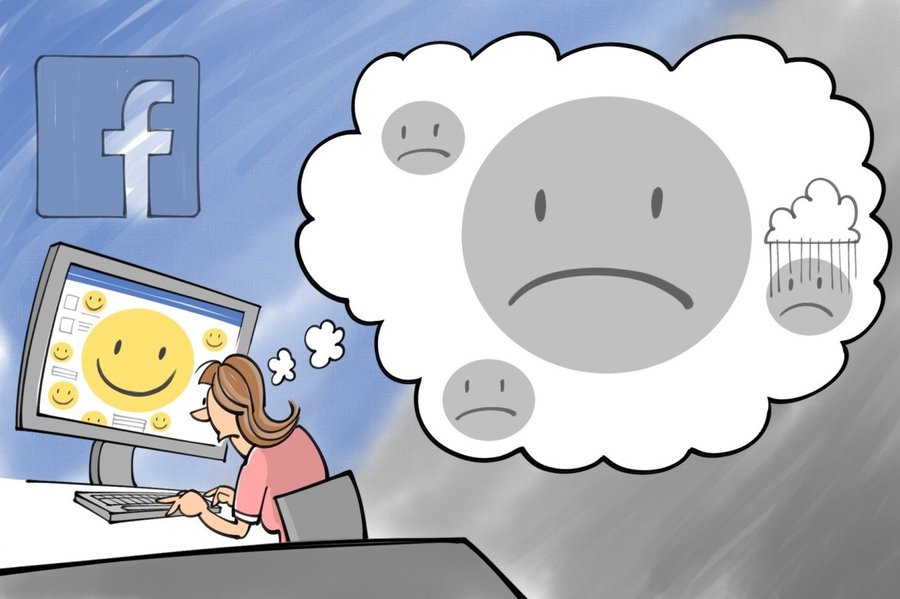I think a lot of us have experience with Facebook depression.
(** Raises hand **)
I took Facebook off my phone on Christmas Day 2015; it still ain’t back on there. (I might have to in a week or two to sell some stuff, though. Alas.) I’ve thought about quitting the site like 181 times. Still haven’t. (That’s me being lazy about true connection.) I’ve even written about Facebook depression before, in this post.
If you doubt the veracity or presence of Facebook as a source of depression, though, we’ve got new research.
Facebook depression research
Let’s hit the canon a little bit.
- Excessive use of Facebook reduces the quality of in-person relationships
- Facebook use can erode self-esteem through unfavorable comparison
- Same deal: self-comparison drives depression
- (Related: social media is really great at connecting — and at tearing people apart!)
Most of those links were research papers. Now we’ve got this new thing on Harvard Business Review about “the more you use Facebook, the worse you feel.” This is a longitudinal study of 5,208 adults, so that’s a nice sample size. Let’s just jump to the results:
Overall, our results showed that, while real-world social networks were positively associated with overall well-being, the use of Facebook was negatively associated with overall well-being. These results were particularly strong for mental health; most measures of Facebook use in one year predicted a decrease in mental health in a later year. We found consistently that both liking others’ content and clicking links significantly predicted a subsequent reduction in self-reported physical health, mental health, and life satisfaction.
Yep. Facebook depression.
So what causes Facebook depression?
Hyper-comparison on steroids. Here’s the problem. Most of Facebook (edit: most of social media) is curated BS. People be showing you their best sides, yo! So the self-comparison you’re doing is to something that might not even be real. As a result, you essentially just went down your own personal rabbit hole for 12 minutes worried about how you compare to a fake thing. See how awkward that is?
“Middle class markers”
I’m 36. I own basically nothing, don’t have kids, and have lost a relationship and a job in the past 18 or so months. I’m not really out here hitting middle class markers like a boss. People pay me and I do OK there, but no one is gonna chase my Facebook and get depressed. But here’s the flip side.
I’ve visited friends in the last 2-3 years who hit all the markers, OK? But that’s just what you see. When you’re live with them, they’re like fighting, kids are breaking shit, they fall asleep at random times, never have sex, etc. We know the drill.
You see one thing.
The reality is different.
The gap is Facebook depression.
Should so we use Facebook less?
Probably. But I don’t see a lot of people doing that — not yet, at least. I now find Facebook boring as ever-loving fuck, and obviously the ads ecosystem has grown up too. So you’re seeing more of that stuff, which is also hysterical. Brands are spending money to target people based on the curated version of themselves they put online. (I know Facebook knows more about us, of course, but I’m speaking broad level here.)
So yea, we should use Facebook less — but the average user spends 50-60 minutes/day on there, and that number is going up before it comes down.
But check out another headline on HBR today: “A Face-To-Face Request Is 34x More Successful Than An E-Mail.”
Remember that: digital isn’t the same as in-person. It can never replace that, for business or personal. When you increasingly start doing that, we’ve got Facebook depression issues.

Bravo, sir.
On a related note, I remember watching that MTV show “Catfish” a few years ago and seeing the host judge someone based on the # of Facebook friends they had. That was enough to get me to tune out and never watch again.
Of course, I had my doubts about that show and that channel anyway (also, fuck “catfishing”, but that’s beyond the scope of this post), but if we’re giving TV shows to people who think that’s a valid metric, we’re kinda fucked.
Giving up Facebook temporarily for Lent was amazing for my sanity. I too deleted it from my phone and have no intention of adding it back on there. I definitely felt better overall not on Facebook–though it was mostly the news about the Trump administration that was all over my news feed that was depressing me every morning. The hard thing was missing out on knowing what some friends were doing. I’m only going back because we have a group on there for the WIT: Women in Theology blog authors and I need to be able to contact them that way.
Facebook is literal hell.
It’s good to see the reality printed in black and white. I’ve seen so many people post depressing (and rarely true) political items when I know for a fact they have very little in the way of political involvement or savvy. It seems to be the “desperate for control in our lives” factors that drive so much of the crap that comes to Facebook. Interesting that people desperate for a solid measure of control in their lives turn to fundamental religion and conservative politics to get their fix. Then, as if they’ve got a gift for the rest of us, they use Facebook to seek validation via number of likes. (CAN I GET AN AMEN? A THOUSAND AMENS)? I dunno. Maybe I really could win a free iPad. There’s a positive thought! Thanks Facebook.